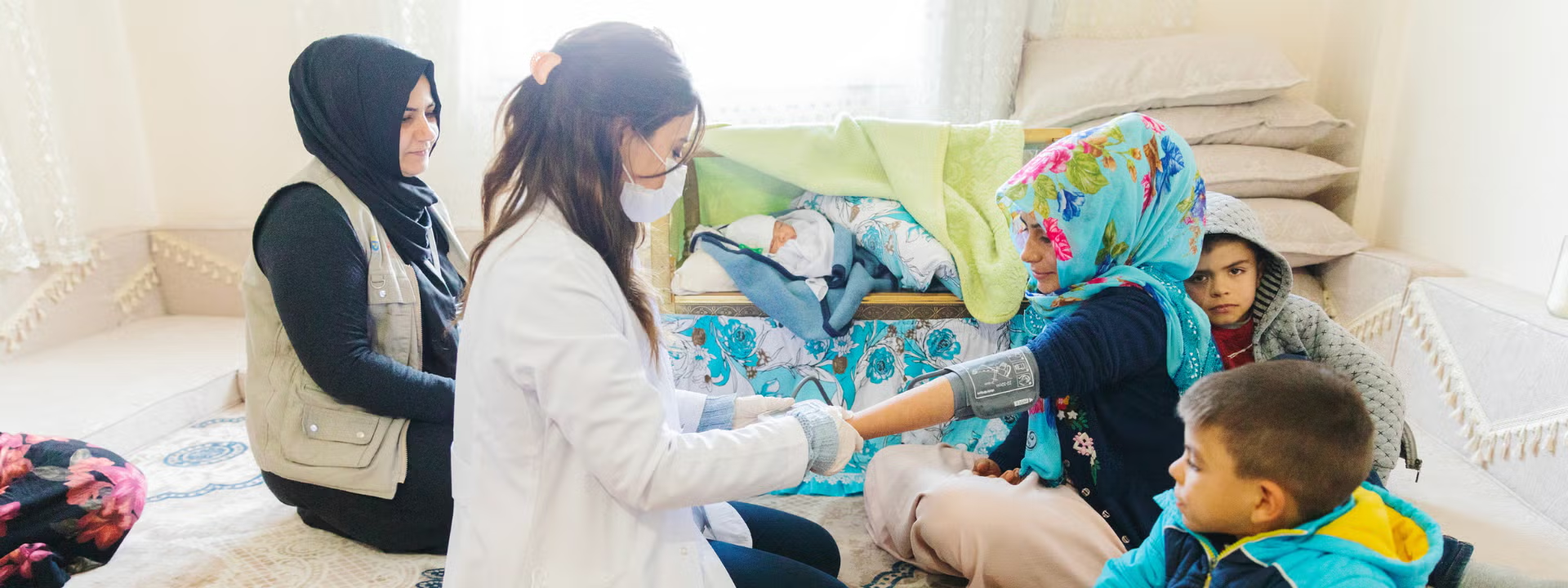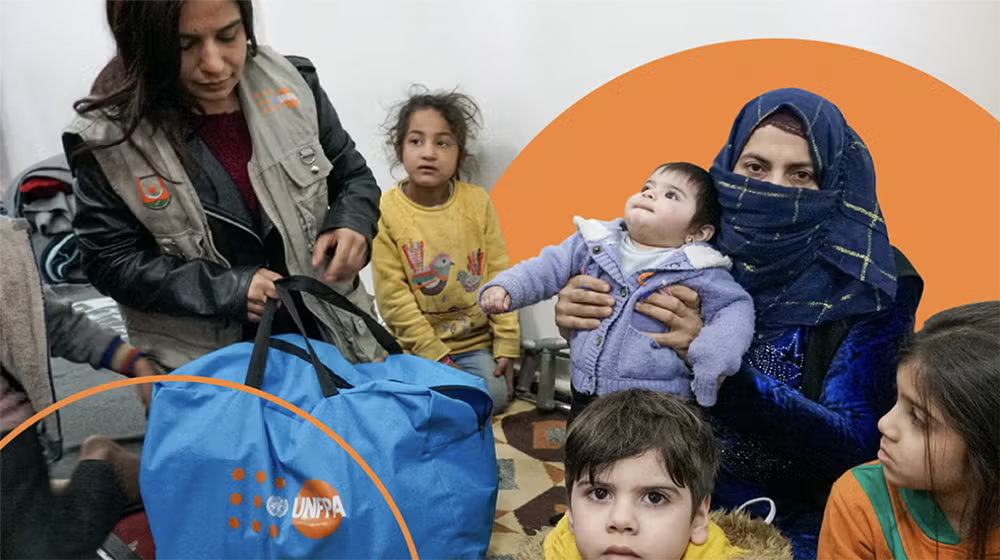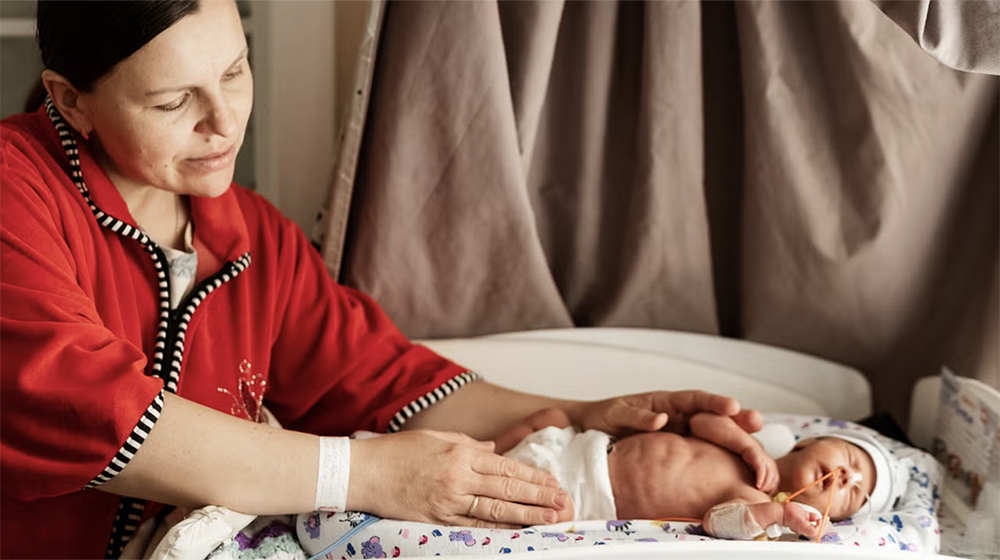Introduction
During conflicts, natural disasters and public health emergencies, sexual and reproductive health (SRH) needs are often overlooked – with staggering consequences. Pregnant women face higher rates of complications due to increased stress levels and infections, while access to healthcare services is reduced. Simultaneously, women and girls become more vulnerable to gender-based violence (GBV), abuse and exploitation. These combined risks and vulnerabilities raise the chances of physical and psychological harm, sexual violence, unintended pregnancies, contracting HIV and other sexually transmitted infections (STI), worsening other reproductive health diseases, and even death.
UNFPA plays a pivotal role in the humanitarian system by leading efforts to prevent and respond to gender-based violence and provide essential sexual and reproductive health services from the onset of emergencies, ensuring the protection of women and girls through integrated, life-saving, high-quality multisectoral services.
Our Challenge/Regional Context
The Eastern Europe and Central Asia region faces multiple humanitarian crises with devastating effects on women and girls. The war in Ukraine remains a pressing humanitarian emergency in the region since Russia launched its full-scale invasion in February 2022. According to UNFPA’s latest appeal, more than 12 million people in Ukraine and around 2 million Ukrainian refugees living in European countries require access to quality sexual and reproductive health services and gender-based violence response and prevention, including access to life-saving care, financial assistance and shelter.
However, displacement and the large-scale destruction caused by the conflict have heightened demand and disrupted the provision of critical services. As a result, women and girls – who make up the majority of the refugee and internally displaced populations – are struggling to have their reproductive health and protection needs met while facing multiple additional challenges, such as limited access to income, family separation, intimate partner violence, insecurity, war trauma and psychological distress.
Natural disasters are another area of rising concern in the region as they bring a cascade of challenges for women and girls.
In February 2023, two devastating earthquakes hit southeastern Türkiye, affecting an estimated 9 million people. Two years later, recovery is underway, but reproductive health, safety, protection infrastructure and other essential services are still below pre-earthquake levels. Many people continue to live in crowded temporary shelters, increasing their vulnerability to gender-based violence, especially for women, girls and others in situations of vulnerability. Meanwhile, the economic impact of the disaster has also led to deteriorations in gender equality and decreased educational opportunities for girls, with families unable to afford to send their daughters to school or resorting to child, early and forced marriages.
Compounding the struggles, the earthquakes happened along Türkiye’s southern border, which was in the midst of a prolonged refugee crisis stemming from the war in Syria. Since the disaster, millions of Syrian refugees living in Türkiye have faced even greater difficulties accessing reproductive health, protection, food, transportation, water, sanitation, and hygiene services.
Taking Action
Sexual and Reproductive Health in Emergencies:
Pregnancy and childbirth do not pause during crises. Even in stable settings, up to 15 per cent of pregnant women experience pregnancy complications, many of which are life-threatening if women have no access to treatment and surgery. This makes access to sexual and reproductive healthcare in emergencies as necessary as food and shelter.
UNFPA procures and manages life-saving sexual and reproductive health kits for use in humanitarian settings, which include all of the pharmaceuticals, medical devices and supplies needed from the first days of a crisis onward. The kits range in size and contents: family planning kits include Long-Acting Reversible Contraception Methods, while other kits contain supplies for the treatment of HIV and STIs, the management of miscarriages and blood transfusions. The largest reproductive health kit weighs over a tonne and has enough to equip a health facility to conduct Caesarean sections and other surgeries.
UNFPA also tailors its responses to each context. Near the front lines of the war in Ukraine, for example, UNFPA helped to build underground maternity ward bunkers and provided mobile incubators and ventilators to ensure life-saving SRH care even during active shellings and power outages. In neighbouring countries hosting Ukrainian refugees, UNFPA strengthened local capacities by upgrading health facilities and conducting trainings with health workers and midwives on how to provide culturally- and trauma-sensitive SRH services.
Moreover, UNFPA deploys mobile teams that act as a lifeline to women and girls in hard-to-reach areas. For isolated or displaced communities, these units can be the only source of sexual and reproductive healthcare, including gynaecological screenings, safe childbirth assistance, prenatal care and treatment for infections. Mobile teams also act as safe entry points for accessing gender-based violence information, prevention services and counselling for survivors.
Gender-based Violence in Emergencies:
Gender-based violence is widespread in times of peace and exacerbated during crises. While GBV is perpetrated everywhere in the world, risks rise both during and immediately after disasters, armed conflict and other crisis situations.
As the United Nations’ lead agency for GBV in emergencies, UNFPA provides quality, life-saving and multisectoral GBV prevention and response programming. As the agency mandated by the Inter-Agency Standing Committee (ISAC) to lead the GBV Area of Responsibility (AoR), UNFPA has the additional responsibility to move the GBV agenda forward and catalyze GBV actors at all levels and to inform GBV prevention, mitigation and response systems.
UNFPA’s gender-based violence programmes ensure survivor-centred care is accessible through women and girls’ safe spaces, crisis centres, shelters and mobile teams, providing GBV case management, psychosocial support, and referrals to critical health and protection services.
As part of its comprehensive approach to GBV programming, UNFPA distributes dignity kits, which play a multifaceted role: containing crucial hygiene, menstrual, and protection items, they not only promote well-being, mobility and safety, but also serve as a crucial entry point to connect women and girls with life-saving GBV services and information.
Partnerships with women-led organizations and the use of digital technologies also allow UNFPA to make sure its interventions are tailored to the local context. In response to the Ukrainian refugee crisis in neighbouring European Union countries, UNFPA and its local partners carried out awareness raising campaigns within communities about the risks of gender-based violence, provided case management and counselling services, established GBV services, including women and girls’ safe spaces and hotlines, and strengthened healthcare systems for GBV survivors.
UNFPA’s multisectoral approach ensures access to safe and effective clinical management of rape and GBV case management services. UNFPA works to increase the capacity of authorities and service providers to deliver high-quality, compassionate and confidential care to survivors. In line with our commitments to leave no one behind and to uphold the rights of all individuals, there is an emphasis on the needs of diverse populations, including youth, LGBTQ+ individuals, persons with disabilities, older people and other marginalized groups.
As part of longer-term recovery efforts and to tackle the root causes of gender-based violence, UNFPA is involved in initiatives that empower women, youth and families. In Ukraine, Vilna Centres and VONA Hubs are spaces dedicated to helping women, including GBV survivors, develop job skills, financial literacy and career goals, while TatoHubs foster responsible fatherhood and gender equality among war-affected families. These programmes and others contribute to both filling immediate needs and building resilience in individuals and communities for the future.




